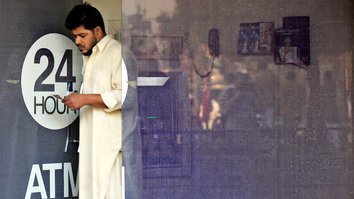PESHAWAR -- Pakistani authorities are clamping down on terrorism financing by freezing bank accounts of disbanded extremist organisations and their facilitators.
The State Bank of Pakistan (SBP) September 8 issued directives to all banks and financial institutions to freeze the accounts of 2,021 banned organisations and individuals whose names are listed in the Fourth Schedule of Pakistan's Anti-Terrorism Act 1997.
The directives comply with "instructions from the Interior Ministry and National Counter Terrorism Authority (NACTA) regarding action against proscribed organisations and persons", SBP spokesman Abid Qamar told Pakistan Forward.
In the first stage of the crackdown, SBP forwarded to banks the names of ther 2,021 depositors whose accounts the government wants frozen, Abid Qamar said.
Authorities gave the banks two weeks to freeze those accounts. The SBP plans to issue another tranche of 1,319 depositors' names soon, Abid Qamar added.
The more than 3,300 names of individuals and organisations came from NACTA after authorities accused them of involvement in terrorism-related activities, he said.
"This is the first time SBP has frozen such a large number of accounts on suspicion of links to terrorism," he said.
"SBP will keep a full check over implementation of its directives," Abid Qamar said.
The 2,021 rogue account-holders include 1,443 in Punjab Province and others from throughout the country, according to SBP.
None of those 2,021 is in Khyber Pakhtunkhwa (KP), but the the majority of names on the second list of 1,319 names come from KP, Abid Qamar said.
Names on the list include Maulvi Abdul Aziz, top cleric of Lal Masjid in Islamabad, and Ahle Sunnat Wal Jumaat leader Molvi Ahmad Ludhianvi.
"Section 11 of the Anti-Terrorism Act 1997 provides for freezing and seizing of money or other property owned directly or indirectly by a proscribed person," explained Waseem Ahmad Shah, a Peshawar-based journalist who covers legal proceedings.
A step in the right direction
Pakistani security analysts and officials fighting terrorism welcome the action.
"This is the long-awaited step in the right direction," said Tariq Pervez, a former NACTA co-ordinator, Dawn reported September 26.
The decision ensures implementation of the National Action Plan (NAP), which the government enacted in January 2015 to fight terrorism, he said.
Pervez called for other actions against terrorists: cancelling their passports and arms licences and banning them from travel.
The mass account freeze "will help state institutions already working to block terror financing in the country," said Rizwan Shah of Peshawar, assistant director of the Federal Investigation Agency (FIA).
Such policies are part of the NAP's strategy of ending terror financing, Rizwan, who fights money laundering for the FIA, told Pakistan Forward.
Such decisions require time and consideration, Rizwan said in response to the argument that authorities should have acted earlier.
Choking off laundering in currency exchanges and banks
The FIA has stopped money laundering in Peshawar's currency exchanges to a large extent, he said, adding that agents conduct raids daily and have made scores of arrests.
"The new step taken by SBP will help block terror financing at an official level through banks," he noted.
"Freezing the bank accounts of banned militant organisations and persons is a major move and much needed," said Aqeel Yousafzai, a Peshawar-based journalist, author and security analyst.
"If we succeed in choking the financial supply to terrorists, we will easily win our war against terrorism," he told Pakistan Forward.

![FIA officials in Peshawar November 10, 2015, display currency seized during an anti-money-laundering raid. [Adeel Saeed]](/cnmi_pf/images/2016/10/03/6266-fia_picture1-585_329.jpg)






